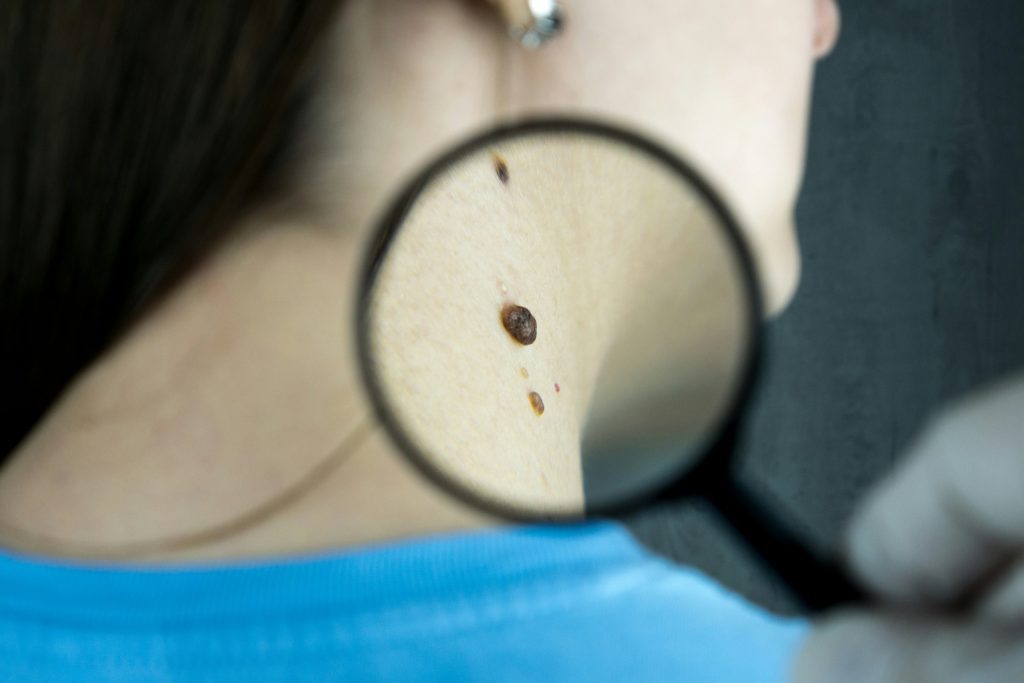In Australia, we’re taught about the dangers of skin cancer early on. We’re cautioned against sunburn, and have the mantra of “slip, slop, slap, seek, slide” drilled into us from a young age.
And with good reason. Australia is the sunniest continent on earth, which means more chance of overexposure to damaging UV rays, and a higher likelihood of developing skin cancer.
Melanoma is the third most common type of cancer in Australia, and the most serious form of skin cancer there is. This is because it matures fast, growing in skin cells called melanocytes (hence the name), and rapidly spreading to other parts of the body.
The good news is that, for the most part, melanoma leaves telltale signs. And a regular skin check means you can catch them early.
Why a routine skin cancer checkup is so important
It’s estimated two in three Australians will be diagnosed with skin cancer at some point in our life, which is why getting a regular skin check is so important.
What is a skin cancer checkup?
It’s actually a simple process. Your GP or dermatologist will look over your skin closely, searching for potentially cancerous skin lesions. They’ll look over your arms, legs, upper body, and head, looking for sunspots, age spots, moles, and carcinomas.
They might perform a visual inspection, or use a dermatoscope. This is a hand-held microscope that allows them to see underneath the skin, searching for signs of skin damage. It uses a special light that allows them to tell the difference between benign and malignant tumours.
If your GP or dermatologist finds a suspicious spot, they’ll make the call on what to do next. They might be able to remove it then and there, or perform a biopsy, where they cut out a little bit of the lesion and send it off for testing.

The benefits of early detection during a melanoma screening
Catching melanoma early is the key: a person diagnosed with melanoma has a 94% chance of surviving for five years. But if left on its own, a melanoma can quickly grow and spread, and can become life-threatening in as little as six weeks.
When looking at your skin there are some early indicators of melanoma to watch out for:
- An existing spot or mole that has changed in appearance or size
- A new spot or mole that has changed in appearance, or grown quickly
- A spot with irregular edges, rather than smooth
- A mole with different colours
- A spot that’s itchy
- A spot that has started to weep or bleed
- The spot might start to raise or bulge, often turning reddish or reddish brown
What is the recommendation for regular skin checks in Australia?
While it’s a good idea for everyone to get a skin check (and your doctor will happily provide one), some people are more at risk than others. You might be more at risk of developing melanoma if you have:
- A fair complexion
- Blonde or red hair
- Blue or green eyes
- Received regular sunburns as a child
- A large number of moles
- A family history of melanoma
Unfortunately, skin cancer doesn’t have the manners to wait until your next doctor’s appointment to announce itself. So the key is to do them regularly; once a month is a good starting point.
And as you’re the person who’s around your body the most, it’s important that you understand how to do one yourself.
- Start by slowly and carefully looking over your whole body.
- Look at your hands and feet, including underneath and between your fingers and toes.
- Check your arms and legs, upper body.
- Look closely at your face.
- For moles, you can take a photo to track changes over time.
- For places that you can’t easily see, like your head, scalp, neck, and back, get someone to help you.
Then, if you do notice anything of concern, book an appointment with your doctor.
Where to get a skin checkup in Bunbury
As Australians, we’re out in the sun a lot. So as well as using sunscreen, sun protection, and shade, a skin checkup and melanoma screening is another tool in the fight against skin cancer.
So when looking for a skin check in Bunbury, get in touch with Brecken Health. Our GPs can provide a comprehensive skin checkup and melanoma screening as part of your next appointment.
